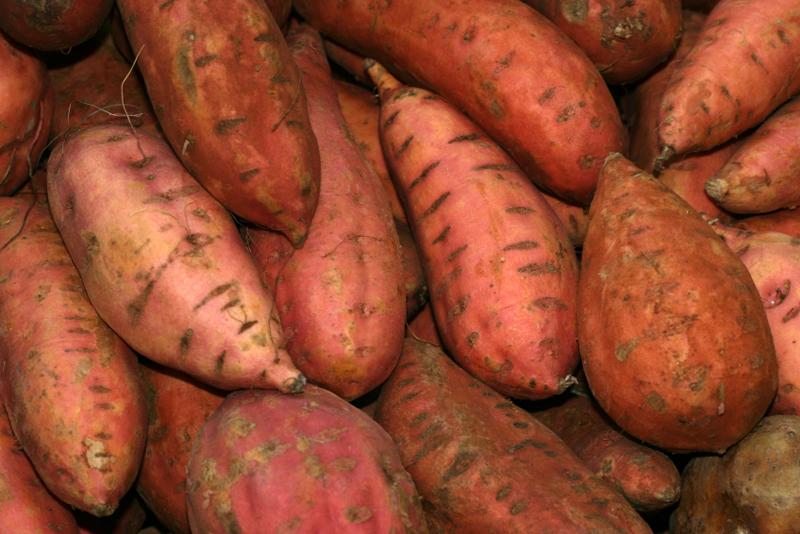by Varaidzo Corinne Sengwe
Who knew that a bite of a small, ball shaped chestnut, boiled in lard could be so potent as to evoke significant memories within me? I did not. It was my first time in the Monragalase region of Piedmont, Italy on what I thought would be an average didactic tour around a farm and a chestnut forest. I was there while studying abroad in Italy for the year, a far way away from my home in Zimbabwe.
As I tasted the boiled chestnut, a local delicacy of the area, I recalled a taste, flavor and texture that was familiar to me. It was not the conventional nut flavor that I had expected. Rather, it was starchy, sweet, and dry all in one mouthful. What I tasted was a bittersweet memory of sweet potatoes from my time at home.
Sweet potatoes are more to me than just oblong shaped tubers with colourful white, beige or maroon skin that grow in the ground. For me, sweet potatoes represent family, enterprise, survival and hard work. This is because some of my family, myself included, faithfully produce sweet potatoes every year, planting in early summer, for an early winter harvest. The extremely laborious physical work produces enough to feed my enormous extended family for the winter season, featuring breakfasts of boiled sweet potatoes as side dishes to roasted sweet potatoes. There are enough left over for enterprise, selling our sweet potatoes to the community for an extra income to cover school fees and pay the necessary bills.
But in Italy, I reminisced as my tour guide, Mr. Castagna, looked comfortable with the ice cold spring rain drops gently falling all over his body. Meanwhile, the tour group was shivering in the cold forest making silent prayers that it would either stop raining or the tour would be brought to a sudden end. Unhinged by the extreme weather conditions, Mr. Castagna continued his highly animated and very detailed explanation and description of the varieties of trees in the area. His determination reminded me of Mai Jasi, the main sweet potato producer in our large family.
Scorching summer sunshine, raging storms, and the not so silent complaints from the labourers who are her children, nieces (myself included) and nephews, do not deter Mai Jasi from producing possibly the best potatoes in the area. They are the envy of all the neighbours; boiled or roasted, the blemish-free, colourful skin effortlessly peels off exposing firm, supple edible ivory flesh.
Personal bias aside, the tubers are good for several reasons. The primary reason is probably that Mai Jasi has a personal devotion to the product. There are vast areas of arable land available in the semi- rural community of Juru, Zimbabwe; but these sweet potatoes are grown within the parameters of her ample yard so she can keep a watchful eye on their growth and make sure that wandering cows do not eat the crop. Weeds are a foreign concept as far as the sweet potato rows and ridges are concerned. We, the children, are responsible for allowing only green heart-shaped leaves to thrive. Everything else that attempts to sprout up out of the ground is an alien threat and instantly uprooted.
I constantly lament that I was born into a family that has an affinity to agriculture. I live in the capital cosmopolitan city, but I find myself usually coerced an hour away planting or weeding mbambaira (the Shona word for sweet potato) on a Saturday morning. Not high on my priority list. My cousins remind me that I am lucky I only visit, even if it is once a week, otherwise it would be my daily fate.
My loud and often angry complaints about the hard work are usually shut down by Mai Jasi’s default statement “as long as you have some land, you will never go hungry.” Hers is a simple philosophy, an echo of generations before her, and a voice she hopes will continue to echo in generations to come. It is to my own peril and demise if I decide not to till the land, or at least have a vested interest in tilling it. I think that the constant repetition of this mantra works as a scare tactic, since my elder brother, who initially despised the hard work of farming, has been converted. He and his wife are now well on the way to being full -time farmers, leaving me as the last one to be converted.
I eat the slightly salted and boiled potatoes prepared as a tasty breakfast for us after a morning in the fields. It is important to know that I like sweet potatoes, but served with mashed sweetened avocado or as grilled chips, seldom for breakfast and never in excess. During some breakfasts, I have slow choking sensations that come from the half-chewed mushy tuber stuck at the roof of my mouth. Perhaps it is the universe’s way of telling me to develop an interest in farming, and then maybe, just maybe, the sweet potatoes and their memories will be easier to swallow. Or perhaps Piedmont’s chestnuts- boiled, roasted, or dried- will seduce me into growing my farming knowledge. And then Mai Jasi’s sweet potatoes will truly be sweet.
Zimbabwean born Varaidzo Corinne Sengwe, is a recent graduate of the Masters Programme in Food Culture and Communications at the University of Gastronomic Sciences in Pollenzo Italy. She is currently based in Zimbabwe exploring the dynamics of the food system.


Comments are closed.